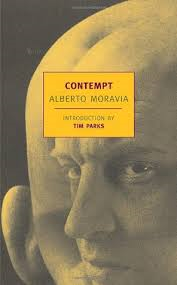Alberto Moravia’s Contempt is a story of two competing dreams. In it, Riccardo recounts the collapse of his marriage from two years of what he describes as perfection to irreconcilable division. The novel is his attempt to chart the decline, to identify the turning point, and to understand why it all went wrong. We are, of course, limited to his point of view – even when his wife, Emilia, is allowed a voice, she deflects his questions and refuses to explain herself on, or in, Riccardo’s terms.
Riccardo seems, at first, the perfect husband: loving, attentive, and, above all, concerned with providing Emilia with the kind of life he feels she wants. To this end, after two years of living in a room in a lodging house, he leases a flat:
“In doing this I did not, however, experience the joyful feelings of a man preparing a home for his bride; on the contrary I was anxious and seriously distressed because I did not know in the least how I would manage when, a few months later , the time came to pay the second instalment. At that time, in fact, I was so desperate that I had almost a feeling of rancour against Emilia who, by the tenacity of her passion had in a way forced me to take this imprudent and dangerous step.”
In order to allow his wife to fulfil her dream of owning a home (in fact described as “more a reason for living than just a dream”) Riccardo gives up his own dream of becoming a dramatist to write for the more financially rewarding film industry, ensuring that he can keep up with the payments on the flat. In retrospect, he pinpoints the night he is commissioned by film producer Battista as the moment when his marriage begins to sour, but is it his sacrifice or Emilia’s which causes this? On the night in question, she reluctantly accepts a lift in Battista’s car, leaving Riccardo to follow on alone:
“I suddenly noticed that her beautiful face, usually so clam and harmonious, was now darkened and, one might say, distorted by an almost painful perplexity.”
Despite this observation, Riccardo insists, perhaps concerned not to offend Battista, just as he insists she accompany him to future meetings despite her reluctance. Her agreement is not enough for Riccardo, however: he not only requires her to to attend, but to do so as a matter of her own choice:
“At the last moment, when she was ready to go, I would ask her, once more and for the last time, if she really disliked coming with me – not so much because by now I was doubtful of her answer, as in order to leave her no doubts about her freedom of decision.”
This is an interesting insight into Riccardo’s need to control Emilia, and not only to control her actions but her thoughts and feelings. When she tells him she still loves him, he simply believes she is lying in order to retain the flat; when she says she cares nothing for the flat, he again cannot believe her:
“I saw that she had now entered, for some reason unknown to me, upon the path of deceit, and I told myself it would serve no purpose to exasperate her by contradicting her and reminding her of how much she had once desired what she now made such a show of despising.”
Whenever Emilia contradicts his understating of her, he dismisses it. Thus when he forces her to admit that she feels contempt for him (a result of endlessly arguing she does not love him anymore) he is as much frustrated by her refusals to explain as by her revelation – in fact, we sense he cannot believe her without access to her reasoning, perhaps because on this occasion he cannot provide his own: “it was quite impossible that Emilia could have a reason for ceasing to love me.”
Battista invites Riccardo (and, of course, Emilia) to stay in his villa in Capri and work with director Rheingold on a script for a film version of the Odyssey, a story which Moravia uses to echo Riccardo and Emilia’s relationship. It is there that events play out to their conclusion.
Contempt is a forensic examination of the failure of a relationship but one where much of the analysis is ironic and the reader must remain awake and aware to see where the cracks are truly forming. Contempt was my first experience of Moravia, but it won’t be my last. Thanks to Richard and Frances for encouraging me to read the novel, and for enlightening me with their wonderful reviews.
